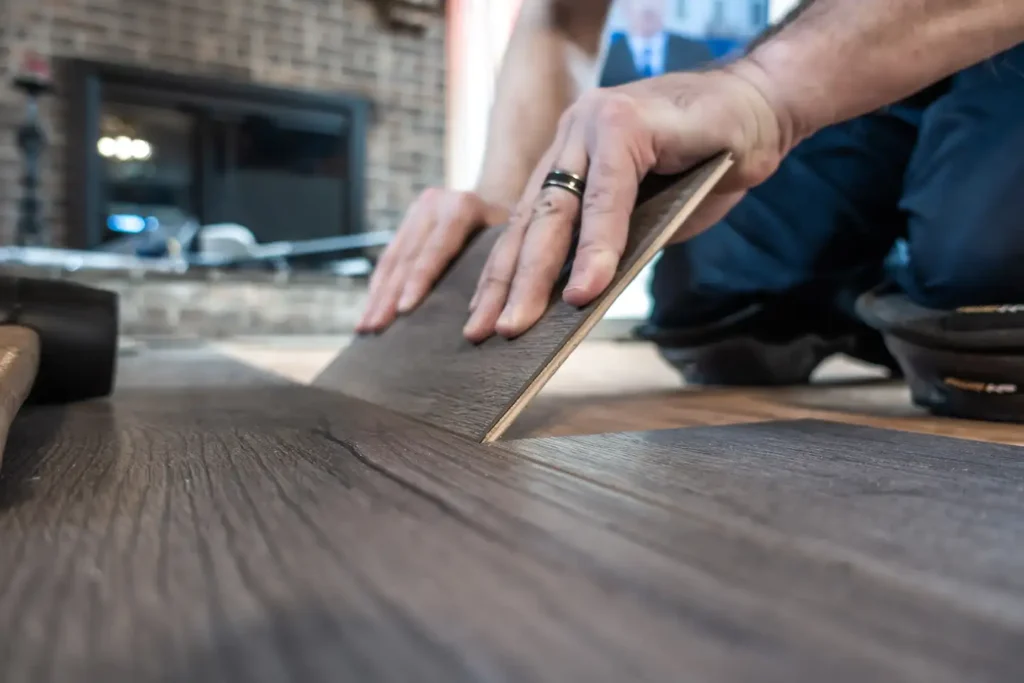Laminate flooring has become a popular choice among homeowners in Houston due to its affordability, durability, and ease of maintenance.
Mimicking the appearance of hardwood or stone, laminate flooring offers a wide range of design options to suit any home style.
In this in-depth guide, we will explore the world of laminate flooring installation, discussing factors to consider, such as material selection, budget, installation methods, and post-installation care.
Selecting the Right Laminate Flooring
When choosing laminate flooring, consider the following factors to ensure you select the best option for your home:
Thickness: Laminate flooring is available in various thicknesses, ranging from 6mm to 12mm. Thicker laminate provides better noise reduction, durability, and comfort underfoot.
AC rating: The Abrasion Class (AC) rating measures a laminate’s resistance to wear and tear. The scale ranges from AC1 (light residential use) to AC5 (heavy commercial use). Choose a rating suitable for the level of foot traffic in your home.
Design and texture: Laminate flooring is available in various designs, mimicking hardwood or stone. Select a design that complements your home’s interior style and consider textured options for a more realistic look and feel.
Underlayment: Laminate flooring often requires an underlayment for moisture protection, noise reduction, and added comfort. Some laminates come with pre-attached underlayment, while others require a separate purchase.
Budgeting for Laminate Flooring Installation
The laminate flooring installation cost can vary depending on the material, labor, and additional expenses.
Consider the following when budgeting for your project:
Material cost
Laminate flooring is generally more affordable than hardwood or tile. However, the cost can vary depending on the quality, design, and thickness of the laminate you choose.
Labor cost
While laminate flooring installation can be a DIY project, hiring a professional installer has its benefits. Obtain quotes from multiple installers to get a clear idea of labor costs in your area.
Additional expenses
Besides material and labor costs, other expenses may include underlayment, molding, and transition pieces. Also, account for any costs associated with subfloor preparation and old flooring removal.
Preparing for Laminate Flooring Installation
Proper preparation is critical to a successful laminate flooring installation.
Follow these steps to ensure your space is ready:
- Clear the room: Remove all furniture, appliances, and personal items from the area to create a clear workspace.
- Inspect the subfloor: The subfloor must be clean, level, and dry before installation. Address any uneven areas or damage before proceeding.
- Acclimate the laminate: Laminate flooring must acclimate to the room’s temperature and humidity for at least 48 hours before installation.
Consult the manufacturer’s recommendations for the appropriate acclimation time.
Laminate Flooring Installation Methods
There are several installation methods for laminate flooring, each with benefits and drawbacks.
The most common method is:
Floating installation: Most laminate flooring uses a click-lock system, which allows the planks to be snapped together without needing glue or nails.
The floating installation method is ideal for DIY installations and can be installed over existing flooring, such as tile or vinyl.
Hiring a Professional Installer
Although installing laminate flooring can be a do-it-yourself endeavor, enlisting the help of a professional installer comes with numerous advantages:
- Proficiency: Skilled installers possess the necessary experience and knowledge to tackle unforeseen obstacles, guaranteeing a seamless installation process.
- Time-saving: Competent installers can finish the project swiftly and effectively, allowing you to save time and reduce inconvenience in your home.
- Warranty preservation: Certain laminate flooring manufacturers mandate professional installation to uphold the product warranty.
Employing a certified installer ensures your investment is safeguarded. - Quality: A professional installation guarantees that your laminate floors are installed correctly, resulting in a durable, long-lasting, and visually appealing floor.
Caring for Your Laminate Floors Post-Installation
To keep your laminate floors in top condition and prolong their lifespan, it’s essential to follow proper care guidelines after installation:
- Cleaning: Regularly sweep or vacuum laminate floors using a soft-bristle broom or a vacuum cleaner attachment specifically designed for laminate surfaces. Refrain from using abrasive chemicals, steam cleaners, or an excessive amount of water during the cleaning process, as these can cause damage to the laminate material.
- Scratch prevention: Apply felt pads to the bottoms of furniture legs and use area rugs or floor mats in high-traffic zones to reduce the risk of scratches and indentations.
- Humidity control: Ensure consistent indoor humidity levels, typically 30-50%, to prevent warping or other damage to the laminate planks.
- Minor damage repair: Laminate flooring cannot be sanded and refinished, unlike hardwood floors. Nonetheless, you can address minor scratches or dents with a laminate repair kit or touch-up pen, available at most home improvement stores.
Choosing the Right Laminate Flooring for Your Home
Opting for laminate flooring installation is a budget-friendly and fashionable alternative for homeowners seeking the appearance of hardwood or stone without the hefty cost.
Considering aspects such as laminate thickness, design, installation technique, and post-installation maintenance, your laminate floors can offer a long-lasting, appealing, and easy-to-care-for solution for your living space.
Whether you choose a DIY approach or engage the services of a professional installer, thorough planning and preparation are vital to achieving a successful laminate flooring installation that you can take pleasure in for years to come.





